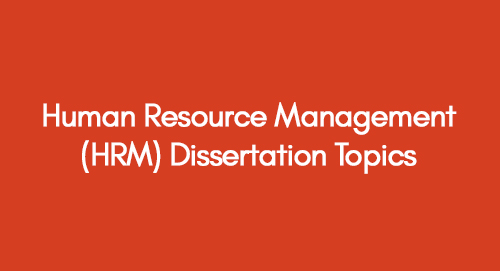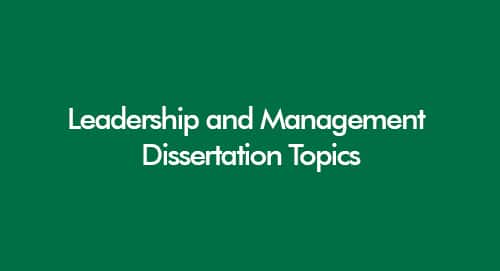
Healthcare Management Dissertation Topics | Find 157+ Latest Ideas
November 14, 2020
International Relations Dissertation Topics | 42+ Latest Ideas
November 14, 2020Human resource management (HRM) refers to the management of an organisation’s workforce. In this modern age, efficient HRM is vital for a business's success. Research in HRM provides an exciting opportunity for students and researchers to propose viable recommendations. Thus, the selection of human resource management dissertation topics is crucial for students.
Business Management Dissertation Examples
Premier Dissertations has prepared a list of 157+ up-to-date research topics in human resource management for 2025.
Project Management Dissertation Topics | Business Management Dissertation Topics
Latest Dissertation Topics in Human Resource Management Dissertation 2025
Most Researched Human Resource Management (HRM) Thesis Topics
Trending Human Resource Management (HRM) Research Topics
Human Resource Management (HRM) Dissertation Topics for Undergraduate Students
Topic 38. Analysing the Role of Remote Work in Employee Retention: A Quantitative Study
Topic 39. Examining the Impact of Diversity and Inclusion Policies on Organisational Culture: A Case Study
Topic 40. Assessing the Effectiveness of Employee Wellness Programmes in Enhancing Productivity: A Systematic Study
Topic 41. Understanding the Influence of Artificial Intelligence on Recruitment Processes: A Qualitative Study
Topic 42. Evaluating the Relationship Between Leadership Styles and Employee Job Satisfaction: A Quantitative Study
Topic 43. Analysing the Role of Gamification in Employee Engagement Strategies: A Systematic Study
Topic 44. Examining the Impact of Flexible Working Hours on Work-Life Balance: A Case Study
Topic 45. Assessing the Effectiveness of Training and Development Programmes on Employee Performance: A Quantitative Study
Topic 46. Understanding the Role of Emotional Intelligence in Effective Team Management: A Qualitative Study
Topic 47. Evaluating the Influence of HR Analytics on Talent Management Decisions: A Systematic Study
Topic 48. Analysing the Impact of Organisational Change on Employee Motivation: A Case Study
Topic 49. Examining the Role of Performance Appraisals in Career Development: A Quantitative Study
Topic 50. Assessing the Effectiveness of Conflict Resolution Strategies in the Workplace: A Systematic Study
Topic 51. Understanding the Influence of Employer Branding on Recruitment Outcomes: A Qualitative Study
Topic 52. Evaluating the Relationship Between Organisational Justice and Employee Loyalty: A Quantitative Study
Topic 53. Analysing the Role of Cross-Cultural Training in Enhancing Team Performance in Multinational Organisations: A Systematic Study
Topic 54. Examining the Impact of Employee Recognition Programmes on Job Satisfaction: A Case Study
Topic 55. Assessing the Role of Psychological Safety in Promoting Creativity in Teams: A Qualitative Study
Topic 56. Understanding the Effectiveness of Mentorship Programmes on Leadership Development: A Quantitative Study
Topic 57. Evaluating the Impact of Work-from-Home Policies on Employee Collaboration: A Systematic Study
Topic 58. Analysing the Influence of Generational Differences on Workplace Communication: A Case Study
Topic 59. Examining the Role of HR Policies in Addressing Workplace Bullying: A Qualitative Study
Topic 60. Assessing the Effectiveness of Employee Feedback Systems in Driving Organisational Change: A Systematic Study
Topic 61. Understanding the Impact of Job Rotation on Employee Skill Development: A Quantitative Study
Topic 62. Evaluating the Role of Leadership Development Programmes in Building Organisational Resilience: A Case Study
Topic 63. Analysing the Impact of Employee Autonomy on Workplace Innovation: A Qualitative Study
Topic 64. Examining the Effectiveness of Compensation Strategies in Reducing Employee Turnover: A Systematic Study
Topic 65. Assessing the Role of Organisational Support in Promoting Employee Mental Health: A Case Study
Topic 66. Understanding the Influence of Workplace Ethics on Organisational Reputation: A Qualitative Study
Topic 67. Evaluating the Impact of Digital HR Tools on Recruitment Efficiency: A Quantitative Study
Topic 68. Analysing the Effectiveness of Career Counselling in Enhancing Employee Retention: A Systematic Study
Topic 69. Examining the Role of Corporate Social Responsibility in Employee Engagement: A Case Study
Topic 70. Assessing the Relationship Between Job Security and Employee Commitment: A Quantitative Study
Topic 71. Understanding the Effect of Organisational Hierarchy on Decision-Making Processes: A Qualitative Study
Topic 72. Evaluating the Role of Employee Advocacy in Enhancing Employer Branding: A Systematic Study
Topic 73. Analysing the Impact of HR Interventions on Workplace Diversity and Inclusion: A Quantitative Study
Topic 74. Examining the Effectiveness of Onboarding Processes in Enhancing New Employee Integration: A Case Study
Topic 75. Assessing the Role of Workforce Planning in Aligning HR Strategies with Business Objectives: A Systematic Study
Topic 76. Understanding the Impact of Remote Team Leadership on Employee Productivity: A Qualitative Study
Topic 77. Evaluating the Effectiveness of E-Learning Platforms in Supporting Employee Skill Development: A Quantitative Study
Human Resource Management (HRM) Dissertation Topics for Master Students
Topic 78. Analysing the Impact of Leadership Styles on Remote Team Performance: A Systematic Study
Topic 79. Examining the Effectiveness of Employee Engagement Strategies in Start-ups: A Case Study
Topic 80. Assessing the Role of Artificial Intelligence in Streamlining HR Recruitment Processes: A Quantitative Study
Topic 81. Understanding the Relationship Between Job Satisfaction and Employee Turnover in Multinational Companies: A Qualitative Study
Topic 82. Evaluating the Impact of Organisational Development Interventions on Employee Morale: A Systematic Study
Topic 83. Analysing the Role of Gamification in Enhancing Employee Training Effectiveness: A Case Study
Topic 84. Examining the Influence of Work-Life Balance Policies on Female Workforce Retention: A Quantitative Study
Topic 85. Assessing the Effectiveness of Succession Planning in Leadership Development: A Systematic Study
Topic 86. Understanding the Role of Employee Voice in Shaping Organisational Policies: A Qualitative Study
Topic 87. Evaluating the Impact of Employer Branding on Talent Acquisition in the IT Sector: A Quantitative Study
Topic 88. Analysing the Role of Cross-Cultural Training in Improving Expatriate Employee Performance: A Case Study
Topic 89. Examining the Effectiveness of Conflict Management Strategies in Enhancing Workplace Harmony: A Systematic Study
Topic 90. Assessing the Relationship Between Employee Empowerment and Innovation: A Quantitative Study
Topic 91. Understanding the Impact of Diversity and Inclusion Initiatives on Employee Loyalty: A Qualitative Study
Topic 92. Evaluating the Role of HR Technology in Improving Performance Appraisal Accuracy: A Systematic Study
Topic 93. Analysing the Effectiveness of Employee Wellness Programmes in Reducing Workplace Stress: A Case Study
Topic 94. Examining the Relationship Between Remote Work Policies and Employee Collaboration: A Quantitative Study
Topic 95. Assessing the Role of Ethical Leadership in Promoting Organisational Trust: A Systematic Study
Topic 96. Understanding the Impact of Generational Differences on HR Practices in Multinational Organisations: A Qualitative Study
Topic 97. Evaluating the Effectiveness of Employee Recognition Programs on Retention Rates: A Quantitative Study
Topic 98. Analysing the Role of Data Analytics in Predicting Workforce Trends: A Systematic Study
Topic 99. Examining the Impact of Organisational Culture on Employee Engagement in Non-Profit Organisations: A Case Study
Topic 100. Assessing the Effectiveness of Hybrid Working Models in the Post-Pandemic Era: A Quantitative Study
Topic 101. Understanding the Influence of Digital Transformation on HRM Practices: A Qualitative Study
Topic 102. Evaluating the Role of HR in Managing Organisational Change During Mergers: A Systematic Study
Topic 103. Analysing the Effectiveness of Leadership Coaching on Middle Management Development: A Case Study
Topic 104. Examining the Role of Employee Advocacy in Shaping Corporate Reputation: A Quantitative Study
Topic 105. Assessing the Impact of Psychological Safety on Team Dynamics: A Systematic Study
Topic 106. Understanding the Effectiveness of HR Interventions in Addressing Workplace Discrimination: A Qualitative Study
Topic 107. Evaluating the Role of HRM in Fostering Organisational Agility: A Quantitative Study
Topic 108. Analysing the Impact of Flexible Work Arrangements on Employee Engagement: A Case Study
Topic 109. Examining the Relationship Between Leadership Development Initiatives and Organisational Growth: A Systematic Study
Topic 110. Assessing the Effectiveness of Talent Management Strategies in High-Growth Industries: A Quantitative Study
Topic 111. Understanding the Influence of CSR Activities on Employee Job Satisfaction: A Qualitative Study
Topic 112. Evaluating the Impact of Digital HR Platforms on Employee Onboarding Processes: A Systematic Study
Topic 113. Analysing the Effectiveness of Performance Management Systems in Dynamic Work Environments: A Case Study
Topic 114. Examining the Role of HR Policies in Managing Multigenerational Workforces: A Quantitative Study
Topic 115. Assessing the Relationship Between Employee Training Investments and Organisational ROI: A Systematic Study
Topic 116. Understanding the Role of Emotional Intelligence in Effective HR Leadership: A Qualitative Study
Topic 117. Evaluating the Effectiveness of HR Strategies in Addressing Post-COVID Workplace Challenges: A Quantitative Study
Human Resource Management (HRM) Dissertation Topics for PhD Students
Topic 118. Analysing the Impact of Artificial Intelligence on Strategic Human Resource Planning: A Systematic Study
Topic 119. Examining the Role of Leadership Development in Enhancing Organisational Agility: A Case Study
Topic 120. Assessing the Effectiveness of Employee Engagement Initiatives on Organisational Performance: A Quantitative Study
Topic 121. Understanding the Influence of Diversity and Inclusion on Innovation in Multinational Corporations: A Qualitative Study
Topic 122. Evaluating the Effectiveness of Flexible Work Policies in Retaining Top Talent: A Systematic Study
Topic 123. Analysing the Role of HR Analytics in Predicting Employee Turnover: A Quantitative Study
Topic 124. Examining the Impact of Remote Work on Team Collaboration and Productivity: A Case Study
Topic 125. Assessing the Relationship Between Organisational Justice and Employee Well-being: A Qualitative Study
Topic 126. Understanding the Role of Continuous Learning in Shaping Organisational Competitiveness: A Systematic Study
Topic 127. Evaluating the Impact of Digital Transformation on HR Practices in Public Sector Organisations: A Quantitative Study
Topic 128. Analysing the Effectiveness of Talent Acquisition Strategies in High-Growth Startups: A Case Study
Topic 129. Examining the Role of Emotional Intelligence in Conflict Resolution within Teams: A Qualitative Study
Topic 130. Assessing the Effectiveness of Corporate Wellness Programmes on Employee Engagement: A Systematic Study
Topic 131. Understanding the Impact of Ethical Leadership on Organisational Reputation: A Quantitative Study
Topic 132. Evaluating the Role of Succession Planning in Building Organisational Resilience: A Case Study
Topic 133. Analysing the Influence of Digital HR Tools on Workforce Analytics: A Systematic Study
Topic 134. Examining the Impact of Corporate Social Responsibility on Employee Loyalty: A Qualitative Study
Topic 135. Assessing the Effectiveness of Training Programmes in Enhancing Employee Performance in Knowledge-Intensive Industries: A Quantitative Study
Topic 136. Understanding the Challenges of Implementing Diversity Policies in Multinational Corporations: A Case Study
Topic 137. Evaluating the Role of Employee Advocacy in Enhancing Employer Branding: A Systematic Study
Topic 138. Analysing the Effectiveness of Virtual Leadership in Managing Remote Teams: A Qualitative Study
Topic 139. Examining the Relationship Between Psychological Safety and Team Innovation: A Quantitative Study
Topic 140. Assessing the Influence of Organisational Culture on Employee Retention in the Hospitality Industry: A Case Study
Topic 141. Understanding the Role of AI-Powered Recruitment Systems in Improving Candidate Selection Accuracy: A Systematic Study
Topic 142. Evaluating the Effectiveness of Gamification in Employee Training Programmes: A Quantitative Study
Topic 143. Analysing the Impact of Work-Life Balance Initiatives on Employee Job Satisfaction: A Case Study
Topic 144. Examining the Role of Leadership Coaching in Enhancing Executive Performance: A Qualitative Study
Topic 145. Assessing the Relationship Between Employee Voice and Organisational Decision-Making: A Systematic Study
Topic 146. Understanding the Effectiveness of Hybrid Work Models in Enhancing Employee Engagement: A Quantitative Study
Topic 147. Evaluating the Role of HR Interventions in Reducing Workplace Bullying: A Case Study
Topic 148. Analysing the Influence of Cross-Cultural Training on Expatriate Performance: A Systematic Study
Topic 149. Examining the Impact of Employee Feedback Mechanisms on Organisational Change: A Qualitative Study
Topic 150. Assessing the Effectiveness of HR Strategies in Managing Workforce Diversity in Healthcare Organisations: A Quantitative Study
Topic 151. Understanding the Role of Digital Onboarding Processes in Employee Integration: A Case Study
Topic 152. Evaluating the Impact of Employee Autonomy on Organisational Creativity: A Systematic Study
Topic 153. Analysing the Role of Emotional Intelligence in Enhancing Leadership Effectiveness: A Qualitative Study
Topic 154. Examining the Effectiveness of Workforce Planning in Responding to Economic Uncertainty: A Quantitative Study
Topic 155. Assessing the Relationship Between Organisational Support and Employee Mental Health: A Systematic Study
Topic 156. Understanding the Challenges of Implementing AI-Based HR Solutions in Traditional Organisations: A Case Study
Topic 157. Evaluating the Role of Leadership Training in Managing Crisis Situations: A Qualitative Study
The Importance of Selecting a Quality Human Resource Management Dissertation Topic
Human resource management is vital for any organisation to remain competitive and provide an innovative, efficient, and effective work environment. The term 'human resources' was coined in the 1960s when labour relations gained attention for theories of motivation and organisational behaviour. This field aims to make employees more loyal, motivated, and productive. By studying human resource management, you can become a key player in your next employment position and build on the Hawthorne Experiments that initiated the human resources management movement.
Review Our Full List of Latest Research Topics
For more HRM thesis topics, please keep checking our website as we keep adding new topics to our existing list of titles.
GOOD LUCK!
Get 3+ Free HRM Dissertation Topics within 24 hours?


























